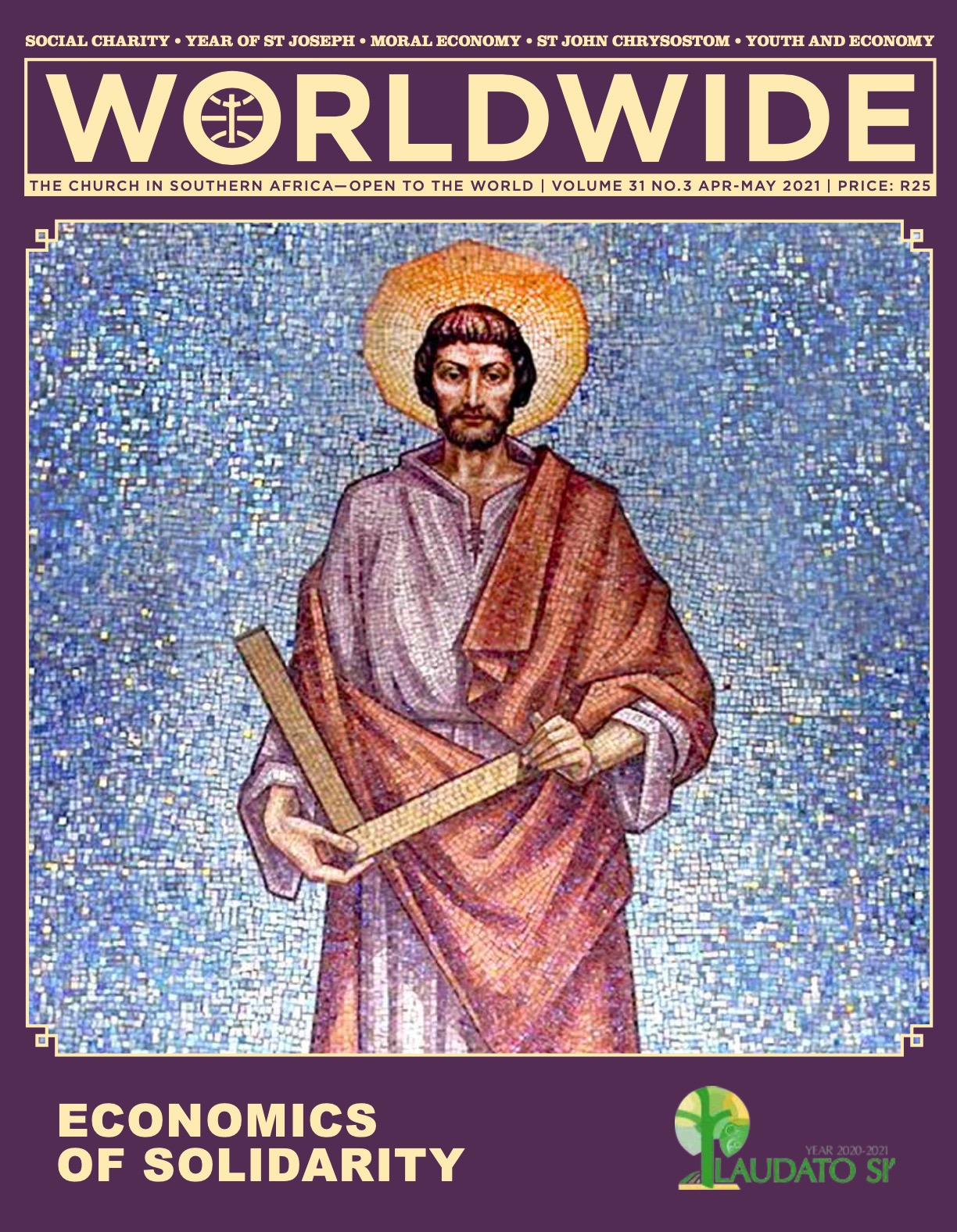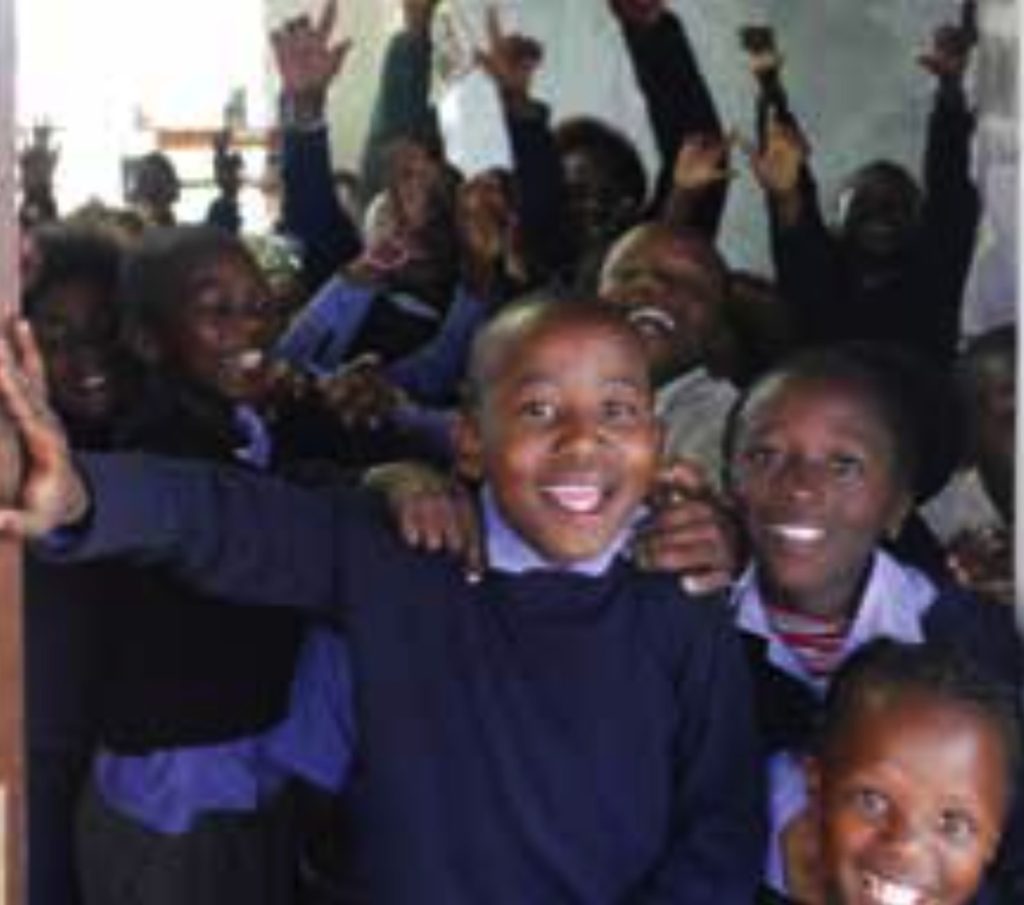
St Joseph and The Dignity of Human Work
We are celebrating the Year of St Joseph. He is, for us Christians, an example of honesty and fidelity, a model of the father figure in the family. He is the humble and firm man who sustained the Holy Family through very difficult situations. This mosaic, portraying him as a carpenter, reminds us of the dignity of human labour. Through work, we become collaborators in the building of society, contributing to it with our various talents. Job creation and sharing of opportunities need to become part and parcel of a new economics of solidarity. Social charity, sustainability and respect for the environment will be integral elements of that model that aims at respecting the dignity of every person.
RADAR

Photo: Andrew Shiva- commons.wikimedia.
COVID-19 Holds Lessons for The Future of Social Protection
A THIRD of South Africa’s 20 million children were living in households below the food poverty line before the pandemic. The lockdown pushed many more into food insecurity and hunger. COVID-19 crisis did not cause a national food shortage or a distribution failure, but poverty, exacerbated by loss of employment income.
The national income dynamics survey revealed massive job losses: approximately three million fewer people were employed in April than in February 2020, of them two million were women. Half of the survey respondents said that they ran out of money to buy food in April, and 15% of those who lived with children reported child hunger. This was the case even if most of these households received at least one Child Support Grant (CSG).
The food security of over nine million children was further undermined when schools closed and school feeding programmes stopped operating, straining more the resources of caregivers who needed to replace the lost meals. In a pernicious twist, food prices rose substantially too.
Inadequacy of the social protection programme
South Africa’s extensive social grants programme transfers close to 18 million grants to low income and vulnerable people each month. The CSG targets vulnerable households, including 80% of individuals in the informal sector. It is the most pro-poor of all the grants and has the broadest reach, as it is paid to over seven million caregivers to support nearly 13 million c hildren. However, the CSG — R440 per month in 2020 — has not been enough to provide for a child’s nutritional needs in a situation of shock, like COVID-19, which amplified the existing inequalities and vulnerabilities and drew attention to gaping holes in the safety net.
Some temporary relief came with the disaster relief package, namely, a R300 top-up to the CSG and R250 top-ups to the other existing grants. It also included a new R500 caregiver monthly allowance and a R350 COVID-19 social relief of distress grant, this for working-age unemployed adults not receiving any other grant. They were scheduled to last until October 2020, and a further extension of the Covid 19 grant was announced by the president in February this year.
However, the grant top-ups were not extended after October, neither was the caregiver allowance. Caregivers, mostly women, who received the CSG for their children, were excluded from applying for the social relief of distress grant for themselves. The same rule doesn’t apply to elderly caregivers, nearly a million pensioners, who receive the older persons grant and also the CSG. The system recognises that the elderly caregiver and the child both need income support — they cannot be expected to share a single grant, but this is not applicable in the case of unemployed caregivers.
Women were also over-represented among those who lost jobs or were furloughed in 2020 during Covid 19, but under-represented in the support mechanisms put in place for employees who lost work, since they were less likely employed in the formal sector than men.
Child hunger and malnutrition
UN human rights bodies have advised that families with children should be prioritised in relief programmes. Poor child nutrition has devastating effects, stunting their growth and hollowing out their life chances.
A quarter of children under five years are too short for their age due to chronic under-nutrition. This number has not shifted substantially in the last two decades. Despite its wide reach, the meagre CSG has not been able to reduce the persistently high stunting rates.
The national income dynamics survey tracked measures of adult and child hunger over 2020. The pattern is clear: there was a dramatic rise in hunger in the early months of lockdown, which was reduced to some extent by July and August. After cessation of the top-ups and caregiver grants, these improvements were reversed. Child hunger increased despite more relaxed lockdown regulations and some improvement in the employment figures.
NECESSARY MEASURES
From a piecemeal, temporary and insufficient disaster relief grant, it is time to progress to an adequate social protection for all. There are three recommendations that flow from this:
• The government must invest in increasing the amount of the CSG.
• The COVID-19 social relief of distress grant must be changed into a permanent income support grant for adults.
• The income support grant must be made available to unemployed caregivers, including those who receive the CSG.
From a child health and development perspective, an increase in the value of the CSG is key, at least to a level beyond
the food poverty line. This needs to be complemented by programmes to support the nutrition and mental health of pregnant women. Tackling the persistent burden of malnutrition is an urgent imperative. It will be costly in the short term, but failure to do so will be too costly for children, their families and for the country in the long term. (Katharine Hall, The Conversation Africa, at https://allafrica.com/)
| Dates To Remember |
|
April 1 – Holy Thursday; 2 – Good Friday; World Autism Awareness Day; 3 – Holy Saturday/Easter Vigil; 4 – Easter Sunday; International Day for Mine Awareness and Assistance in Mine Action; 6 – International Day of Sport for Development and Peace; 7 – International Day of Reflection on the 1994 Genocide in Rwanda; World Health Day; 11 – Divine Mercy Sunday; 21 – World Creativity and Innovation Day; 22 – International Mother Earth Day; 25 – World Malaria Day; 28 – World Day for Safety and Health at Work; 30 – Our Lady, Mother of Africa May 1 – St Joseph the worker; Workers Day; 3 – World Press Freedom Day; 8 – Remembrance and Reconciliation for the Victims of the Second World War; 15 – International Day of Families; 16 – Ascension of the Lord; World Communications Day; 20 – World Bee Day; 22 – International Day for Biological Diversity; 23 – Pentecost Sunday; 24 – Closure of Special Laudato Si’ Anniversary Year; 29 – International Day of UN Peacekeepers; 30 – World No-Tobacco Day |
